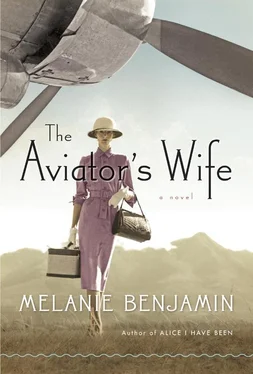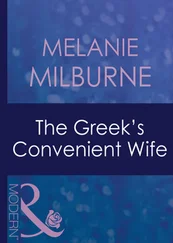“Daddy offered to advise the colonel about all the money being thrown at him, and when the colonel asked what he could do by way of thanks, Daddy said, ‘Fly down to Mexico!’ ”
I laughed. “That’s just like Daddy!”
“And it was brilliant, because he couldn’t have asked for a better public relations coup. The president of Mexico is over the moon, you know. And, really, central casting couldn’t have found a better man for the job. Just look at him. The colonel is quite handsome.”
“You really think so?”
“Well, of course! Don’t you?”
“I suppose, in a way,” I replied carefully. But I felt my sister’s bright, hard gaze turn on me anyway. Oh, she was so like Mother at times!
“Anne, there’s something I want you to understand,” she began, in a strangely ominous tone. But before she could continue, Mother swooped down upon us.
“Why, girls, there you are! Hiding over here! I told you I want your help with Colonel Lindbergh. He’s being mobbed by people—oh, those women! You’d think he was the second coming of Valentino!—and the dancing is about to start. He insists that he won’t dance, and so I thought that you could sit with him, Elisabeth, and keep some of those horrid women away—did you see the countess? She’s twice his age, at the very least. And, of course, Anne, you can help, dear. No one expects you to dance. Now I must go talk to the president. Señor Calles, it’s such an honor!” And just as quickly, Mother glided over to greet the president of Mexico (whom I recognized from a newspaper photo).
“What if I wanted to dance?” Elisabeth said, in as close to a grumble as I’d ever heard from her. I followed reluctantly as she weaved her way toward Colonel Lindbergh. He was still standing next to my father, that grimly gracious smile on his face.
“Do you?”
My sister stopped, spun around, and looked at me. “No!” We both laughed, united, once more, in exasperation at our mother. “But she might have asked me first!”
Still laughing, she tugged on Colonel Lindbergh’s sleeve and tilted her face up to his; she was so pretty, her face flushed, her fair curls bouncing, that I knew the colonel would be helpless. I’d never met a man who hadn’t first fallen for my sister before being rebuffed and finally noticing me.
But Elisabeth wouldn’t rebuff Colonel Lindbergh; she was famously particular, defiantly unmarried despite my parents’ best efforts, but even she couldn’t find fault with the most famous man on earth.
And realizing this set me free. Why should I be concerned about any impression I might make on the colonel, when I knew I would make none? Soon I was seated on a sofa in front of the fireplace next to Elisabeth, Colonel Lindbergh on her other side; I knew I was invisible in this situation, and so I behaved as such. I let Elisabeth take up the ball of conversation, while I indulged in my favorite pastime—people watching.
Daddy was in the center of a group of men his age, some of whom I recognized from the board of directors at J. P. Morgan & Co., where he had previously been a partner. They were all talking animatedly—but Daddy was the most animated of all. The smallest one by at least a head—he was only five-foot-three inches tall—he more than made up in energy what he lacked in height and background. He was the only one of his crowd who came from poverty, a fact he never bothered to hide; he was fiercely proud of his humble background, and never let any of us children forget it. Education, education, education: those were his watchwords; so much so that once, a family friend asked me, puzzled, “What is it with you Morrows and education?”
But education had served my father well as he graduated with honors from Amherst, then Columbia Law School, where he met many of the sons of the bankers who would summon him to J. P. Morgan. And now, he was a diplomat; at the beginning of what many felt was a promising political career. Some even predicted he could reach the White House!
Mother was swimming about, soothing and greeting and smoothing over any turbulence caused by Daddy’s occasional outbursts. It was her usual role. She was as silky as he was rumpled; even tonight, his tuxedo looked two sizes too big. Daddy always claimed that he had married up, and nights like this gave merit to that claim. I was proud of my mother, despite our misunderstandings; she looked every inch the diplomat’s wife in her tasteful green gown, long gloves, and ability to be everywhere at once without seeming to break her slow, regal glide. She always appeared taller than Daddy, even though she was an inch shorter. Both of them were graying now; Daddy’s hair was thinning, while Mother’s wiry curls were captured in an old-fashioned Edwardian sweep. She claimed she had no time for the weekly visit to the hairdresser that the newer styles required.
Assured of my invisibility, I didn’t even mind the stares, not entirely furtive, that continued to be directed toward Colonel Lindbergh. He really was a magnet; a raw, yet strangely charismatic figure, direct and true. No polish, no practiced weariness; watching him, you couldn’t help but sense the impossibility of what he had accomplished—and yet also the inevitability of it. He exuded such a quiet self-confidence; every movement he made was so graceful, so deliberate. Even if his speech occasionally faltered while conversing with my sister, his eyes never did. They seemed fixed, always, on something important, something serious, just beyond the horizon.
“Would you like to, Miss Morrow?” The colonel was leaning forward, addressing me; surprised, I instinctively moved away from him. I couldn’t help but notice that he colored a little when I did.
“Would I—would I like to what?”
“Go up in an airplane. Your sister has requested that I take her up, and naturally I would like to extend that courtesy to you. If you’d like to.”
“Flying? Me?” I couldn’t help it; my mouth flopped open like a fish. But I had never even imagined such a thing!
“Don’t worry, it’s perfectly safe,” the colonel said with a smile—the first genuine one I had seen from him. Suddenly he looked quite boyish; he ducked his head, and his hair fell out of its careful part so that it brushed his forehead. “Flying is perfectly safe. Up there on the currents, like the birds—it’s a holy thing. Nothing has ever made me feel so—so in control of my own destiny. So above all the petty strife and cares of the world. It’s down here where the danger is, you know—not up there.”
I had thought the colonel capable of many things, but not of poetry. And listening to him, I realized, with a thrill, that I did want to fly; to experience this holy thing, to soar above the earth as he had done. To be above all; to be above worry and fear and, yes, petty strife, but mainly, simply to be above myself —this awkward body, this mind full of doubt and heart full of longing.
“Oh, I would—” I began, but then realized a mob of people was standing in front of us, listening to our conversation as if we were actors in a play. Suddenly my tongue felt thick and clumsy in my mouth, and I simply shook my head, knowing that I was disappointing him, but unable to respond as I wished with so many people watching.
But this time, he didn’t color or withdraw; his blue eyes looked at me with a curious expression. Literally curious —as if I was a new species he had just discovered. Blushing, I turned away, and was grateful to see Mother hurrying up to us, a tight smile on her face—imperceptible worry in her eyes.
“What do I hear? Are you going to take my daughters up in your plane, Colonel?”
“If they would like to go. Naturally, I extend the invitation to you, Mrs. Morrow.”
Читать дальше












